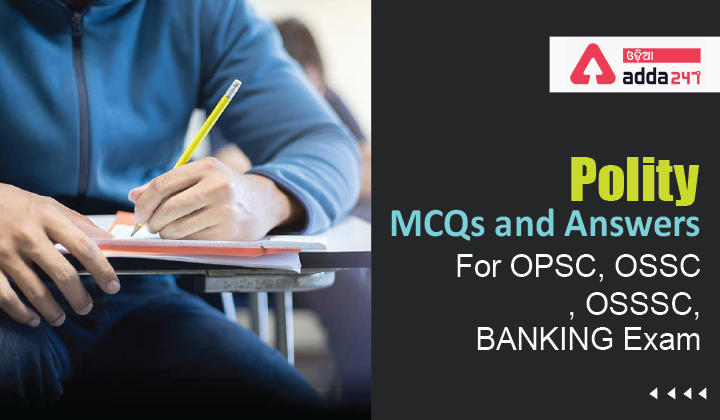Polity MCQs and Answers: Polity MCQs are very important for OPSC, OSSC, OSSSC & Other State Exams. Aspirants who are willing to apply for the various Government exams in 2022 must go through the topics of Polity for competitive exams, as Polity is a key part of the syllabus.
Download ADDA247 Odia APP – Appear Latest Exam Test Series & Live Classes
Q1. Panchayati Raj Institutions are primarily the instiutions of
(a) Popular Government
(b) Self-Government
(c) Federal Government
(d) Quasi-Government
S1. Ans.(b)
Sol.Panchayati Raj Institutions are primarily the instiutions of local Self – Governmentof villages in rural India.
Part IX of the Indian Constitution is the section of the Constitution relating to the Panchayats.
Q2. Under Which among the given amendment, education was made a fundamental right –
(a) 83rd amendment in 2002
(b) 83rd amendment in 2003
(c) 86rd amendment in 2002
(d) 87rd amendment in 2003
S2. Ans.(c)
Sol. The 86th amendment of 2002 inserted Article 21A in the Indian constitution, making right to education as one of the fundamental rights.
The 86th amendment act is also known as The Right of Children to Free & Compulsory Education Act. According to Article 21A, the State shall provide free & compulsory education to all children of the age of six to fourteen yrs.
Q3. The 73rd Amendment of the Indian constitution deals with
(a) Minimum age of marriage
(b) Nagar Palikas
(c) Compulsory Primary Education
(d) Panchayati Raj
S3. Ans.(d)
Sol. The 73rd Amendment of the Indian constitution deals with Panchayati Raj.
The Constitution (73rd Amendment) Act was passed in 1992 and it came into effect on 24 April 1993.
Q4. Which of the following Articles of Indian Constitution refers Union Budget as “Annual Financial statements”
(a) Article 110
(b) Article 112
(c) Article 115
(d) Article 86
S4. Ans.(b)
Sol. The Union Budget of Indiais also referred to as the AnnualFinancialStatement in Article 112 of the Constitution of India.
It is the annual budget of the Republic of India.
It is presented by the Union Finance Minister in the Parliament on the first day of February so that it could be materialised before the beginning of new financial year in April.
Q5. From the following languages given below pick out of the one which is official language of a Maharashtra—
(a) Hindi
(b) Urdu
(c) Marathi
(d) Gujarati
S5. Ans.(c)
Sol.
Marathi is the official language of Maharashtra and co-official language in the union territories of Daman and Diu and Dadra and Nagar Haveli.
Q6. How many schedules the Constitution of India contains?
(a) 9
(b) 10
(c) 11
(d) 12
S6. Ans.(d)
Sol.
Indian Constitution originally had eight schedules. Four more schedules were added by different amendments, now making a total tally of twelve. Schedules are basically tables which contains additional details not mentioned in the articles.

Q7. Article 1 of the Constitution declares India as—
(a) Federal State
(b) Quasi-Federal State
(c) Unitary State
(d) Union of States
S7. Ans.(d)
Sol.
Article 1 in the Constitution states that India, that is Bharat, shall be a Union of States. The territory of India shall consist of: The territories of the states, The Union territories and Any territory that may be acquired.
Q8. The Chairman of Council of States (Rajya Sabha) is
(a) Appointed by President
(b) Elected by Parliament
(c) Vice-President is ex-officio Chairman
(d) Speaker of Lok Sabha
S8. Ans.(c)
Sol. The Vice President of India is the ex–officio Chairman of the Rajya Sabha, who presides over its sessions.
Currently, M. Venkaiah Naidu is Vice-president of India, and ex-officio chairperson of Rajyasabha.
Q9. Which one of the following is not a part of Fundamental Rights?
(a) Right to education
(b) Right to establish educational institutions by minorites
(c) Right to be conferred with titles
(d) Right against untouchabilty
S9. Ans.(c)
Sol. Right to be conferred with titles is not a part of Fundamental Rights.
Article 18 of the Indian Constitution prohibits the State from conferring any titles other than military or academic distinctions, and the citizens of India cannot accept titles from a foreign state.
Q10. How is Rajya Sabha dissolved?
(a) At the end of Chairman’s tenure
(b) President dissolves after 5 years
(c) Dissolves with Lok Sabha automatically
(d) None of the above
S10. Ans.(d)
Sol. The Rajya Sabha or Council of States is the upper house of the bicameral Parliament of India.
The Rajya Sabha meets in continuous sessions, and unlike the LokSabha(lower house of the Parliament), the Rajya Sabha is not subjected to dissolution.
Q11. In every election, Election Commission of India issues a Model Code of Conduct for political parties and candidates to conduct elections in a free and fair manner.
When did it issued the Code of Conduct for the first time
(a) 1951
(b) 1968
(c) 1971
(d) 1991
S11. Ans.(c)
Sol.Holding periodic, free and fair elections are essentials of a democratic system and a part of the basic structure of the Constitution.
In every election, it issues a Model Code of Conduct for political parties and candidates to conduct elections in a free and fair manner.
The commission issued the Code of Conduct for the first time in 1971 for the 5th Lok Sabha elections and has revised it from time to time.
Q12. Which one of the following is not a writ?
(a) Mandamus
(b) Habeas Corpus
(c) Certiorari
(d) Severabilty
S12. Ans.(d)
Sol. Severabilty is not a writ.
The Constitution broadly provides for five kinds of “prerogative” writs: habeas corpus, certiorari, mandamus, quo warranto and prohibition.
Q13. Which one of the following Articles of the Indian Constitution has never been enforcedin the country?
(a) Article 60
(b) Article 360
(c) Article 352
(d) Article 356
S13. Ans.(b)
Sol. Article 360 of the Indian Constitution has never been implemented into action.
Aricle 360 of the Indian Constitution empowers President to invoke financial emergency in India, in case of Financial Crisis.
No use of Article 360 (Financial Emergency) has ever been made.
Q14. Article 26 of the Indian Constiution deals with which of the folowing?
(a) Protection of certain rights regarding fredom of spech, etc.
(b) Fredom to manage religious afairs
(c) Protection of interests of minorites
(d) Fredom as to payment of taxes for promotion of any particular religion
S14. Ans.(b)
Sol. Article 26 of the Indian Constiution deals with freedom to manage Religious affairs.
Article 26 guarantees all religious denominations and sects to manage their own affairs in matters of religion.
Q15. Which of the following qualifications are laid down by the constitution for a person to be appointed as the Governor of a state?
- He should be a citizen of India.
- Must have completed the age of 35 years.
- He shall not belong to the state where he is appointed.
(a)1 only
(b)1 & 2 only
(c)1, 2 & 3
(d)None of the above
S15.Ans.(b)
Sol. The Constitution lays down only two qualifications for the appointment of a person as a governor are:
- He should be a citizen of India.
- He should have completed the age of 35 years.








